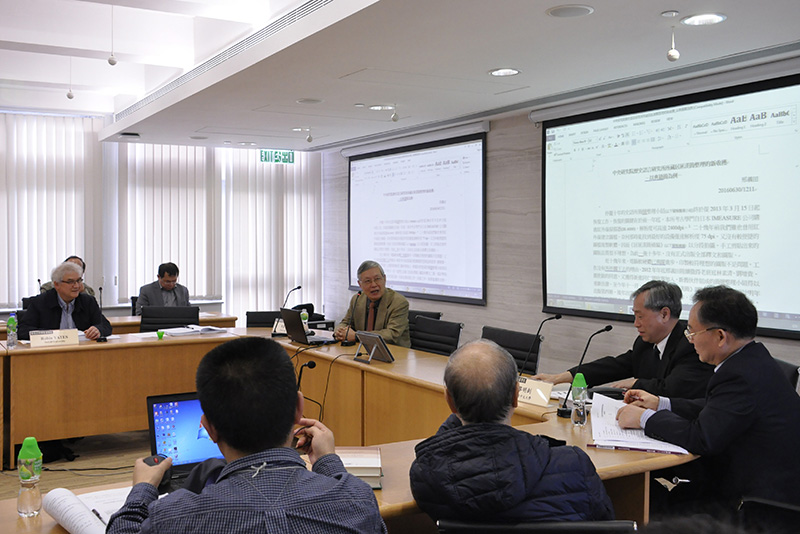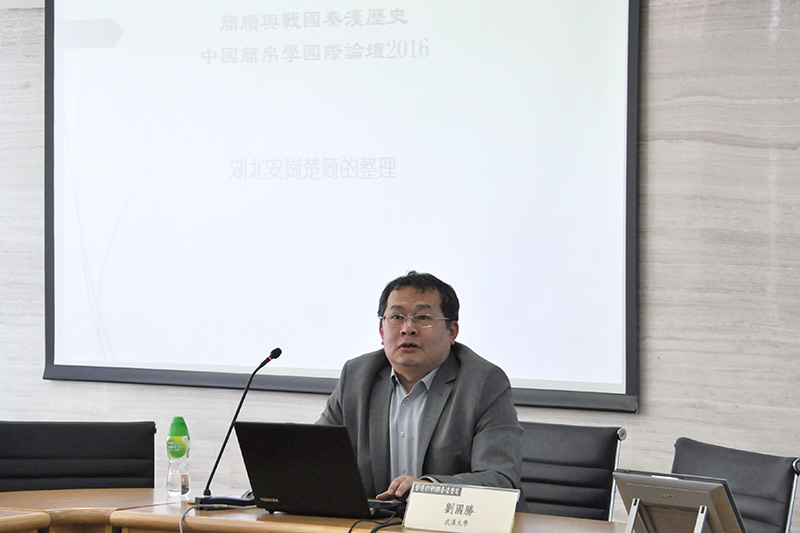Department News
Welcome back!
Hope you all had a wonderful Christmas and New Year holiday!
Personalia
We extend our welcome to Prof. POON Shuk Wah, who has joined the Department of History as Associate Professor with effect from 3 January 2017.
Prof. POON Shuk Wah, gained her Bachelor’s and MPhil degree from Hong Kong Baptist University. She received her PhD degree in Humanities from the Hong Kong University of Science and Technology. Before joining the Chinese University of Hong Kong, she was an Associate Professor at Lingnan University. Prof. POON teaches HIST 2100 China Today in Term 2.
Academic Activities
Recapping the academic seminar “華僑史的性別維度:自梳女與僑居地及僑鄉的案例” conducted by Prof. YIP Hon Ming on 25 November 2016
With a long-term study of the Comb Sisters, their hometown and oversea places of residence, and a series of previous academic works on the formation and development of the tradition of the Comb Sisters in southeast China from the perspective of women’s history and gender history, Prof. YIP Hon Ming put the micro observation of working and living experiences of the Comb Sisters in Singapore and Malaysia into a larger perspective of transnational migration. Through an introduction of Samsui Women (female construction workers with red bandana) and Majie (domestic servants), two outstanding groups of female Chinese labourers abroad, she pointed out the fact that female labour is an unneglectable group in the wave of Chinese labour migration around the turn of 20th century, and these women made use of guild halls, lineages and sisterhood groups to earn a living and established their own union. Then in the case study of Bing Yu Tang, Prof. YIP showed the influence of preservation of the Comb Sisters tradition in southeast China on the living strategy and life choices of the Comb Sisters working in Singapore. Thus she argued that this interaction between the practice of providing support for the Comb Sisters in their hometown and the sustainability of the Comb Sisters tradition abroad showed the complexity contributed by gender, class and group identity in female labourer migrants. Since the study of the Comb Sisters relies heavily on oral history, this research also has called for a rethinking of oral history methodology. Prof. YIP realised that many of her informants were reluctant to talk about some important topics about their lives such as religion and their relationship with employers’ family, especially the employers’ children who the Comb Sisters raised. Therefore, Prof. YIP stressed the importance of comprehensive investigation and seeking for the underlying implication of avoidance and hiding.
Recapping the academic seminar “Town Planning and Hong Kong’s Governance Efficiency (1841-2015)” conducted by Prof. HO Pui Yin on 2 December 2016
Recapping the academic seminar “Town Planning and Hong Kong’s Governance Efficiency (1841-2015)” conducted by Prof. HO Pui Yin on 2 December 2016
From the perspective of governance and town planning, Prof. HO Pui Yin provided a retrospect of her longue durée research, the urban development of Hong Kong from 1841, on three aspects, infrastructure construction, social needs and planning and control of the government. The infrastructure part focused on three kinds of challenges from Hong Kong’s natural environment, the shortage of drinking water, the threat of typhoons and the scarcity of land. Through analysing the colonial government’s effort to successfully tackle them in infrastructure construction and repositioning Hong Kong as an entrepôt, Prof. HO revealed early urban planning after the opening of Hong Kong’s port, especially the site selection of Victoria, and the formation of the dual development between colonisers and the colonised. Then in the case study of the pestilence crisis in 1894, through analysing the urban space under racial segregation, epidemic control policies of the government and the cultural conflict when public hygiene was enforced in Chinese communities, Prof. HO showed demographic pressures in the process of urban development and the contribution of implementing public hygiene measures in solving such problems. With reviewing the government’s long-term land development project of New Territories, Prof. HO discussed the process of development of a multi-centre metropolitan after the Second World War when Hong Kong was faced with a high population density, which contributed to the efficiency-oriented Hong Kong model on town planning. In conclusion, Prof. HO pointed out that Hong Kong had experienced a process of urban development at different stages, which included early town planning under the idea of establishing a modern city, the expansion of the city centre, industrialisation and polycentric development. Thus, she argued that though the application of new technology has made a great contribution, the foresight and the ability of the government to deal with complexities and meet social needs in planning, demonstrated that government played an important role in the development of such a metropolitan today with its own model of town planning.
Recapping the “Conference on the Studies of the History of Warring States and Qin-Han Periods: From the Perspective of Bamboo and Wooden Manuscripts” held on 12-13 December 2016
The Centre for Chinese History of the Department of History, CUHK; the Center of Bamboo and Silk Manuscripts, Wuhan University; and the Department of History, Kyungpook National University co-organised the “Conference on the Studies of the History of Warring States and Qin-Han Periods: From the Perspective of Bamboo and Wooden Manuscripts ” on 12-13 December 2016.
Members of the Organising Committee, Prof. LAI Ming Chiu of CUHK, Prof. CHEN Wei of Wuhan University and Prof. YUN Jae Suk of Kyungpook National University officiated at the opening ceremony and delivered the opening speeches. Nearly 40 scholars from Canada, Korea, Taiwan, Mainland China and Hong Kong were invited to present papers or act as moderators in this two-day conference. Prof. HSING I-tien of the Academia Sinica and Prof. Robin DS YATES of McGill University delivered keynote speeches. Participants exchanged views on themes relating to the newly excavated bamboo slips and documents to explore the studies of the History of Warring States and the Qin-Han Periods.
Recapping the Workshop on “The War in Premodern East Asia, 1592-1598: Context and Structure” held on 19-20 December 2016
The Workshop on “The War in Premodern East Asia, 1592-1598: Context and Structure”, co-organised by the Department of History, CUHK and the University of British Columbia, was held on 19-20 December 2016. Scholars from Canada, Japan, Korea, Mainland China and Hong Kong were invited to present papers and exchange views on the history of the 16th-century Korea War.
Upcoming Events
Talk Series on "Temples, Charities and Social Control under the Colonial Hong Kong"
The talk series is co-organised by the MA Programme in Comparative and Public History, Department of History, the Chinese University of Hong Kong and the Hong Kong Museum of History. The following lectures will be held on Saturdays in January 2017 at the Lecture Hall, G/F, Hong Kong Museum of History:
| Date: | 7 January 2017 (Saturday) |
| Time: | 3:00pm-5:00pm |
| Topic: | The Floating “Territory”: Hong Kong Urban Immigrants’ Temples and Festivals after World War II |
| Speaker: | Dr. LUI Wing Sing |
| Date: | 14 January 2017 (Saturday) |
| Time: | 3:00pm-5:00pm |
| Topic: | The Chinese Temples Ordinance (1928) as a Tool of Social Control under the Colonial Hong Kong |
| Speaker : | Dr. MA Muk Chi |
| Date : | 21 January 2017 (Saturday) |
| Time : | 3:00pm-5:00pm |
| Topic: | Founders of the Tung Wah Group of Hospitals and their Relationship with the Colonial Government |
| Speaker : | Prof. TING Sun Pao, Joseph Adjunct Professor, Department of History, CUHK |
The talks will be conducted in Cantonese. No reservation is needed. Seats are available on a first-come-first-served basis. For enquiry, please call 3943 7169.
For teachers and students who have information to share with the Department,
please email your articles in both Chinese and English to chanfiona@cuhk.edu.hk by 4:00pm every Tuesday.




















